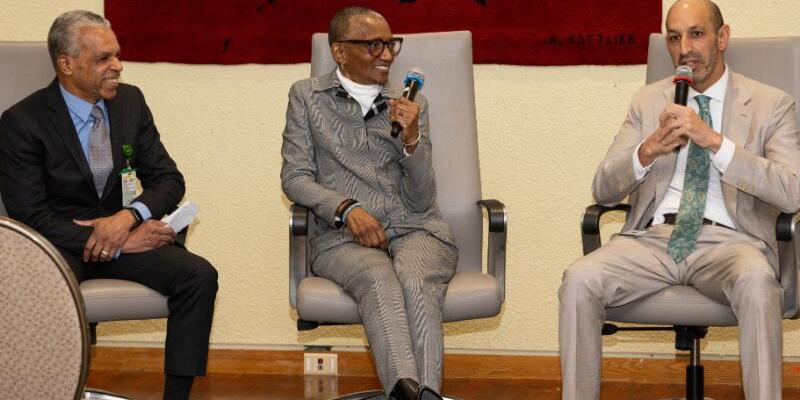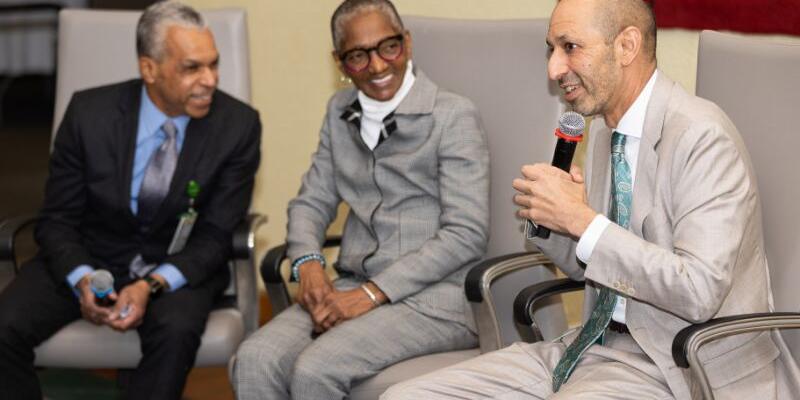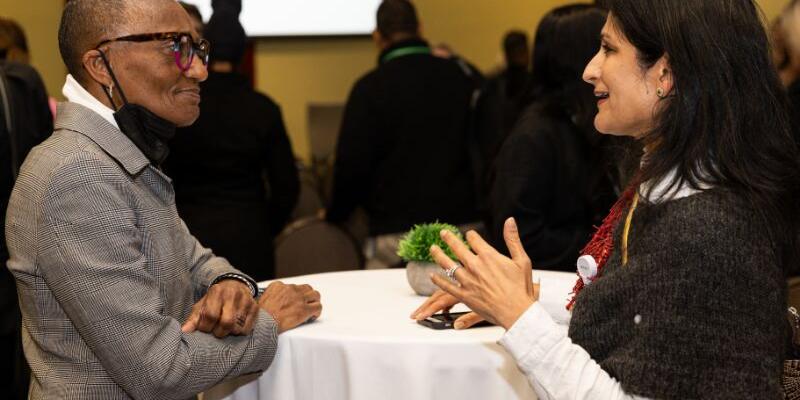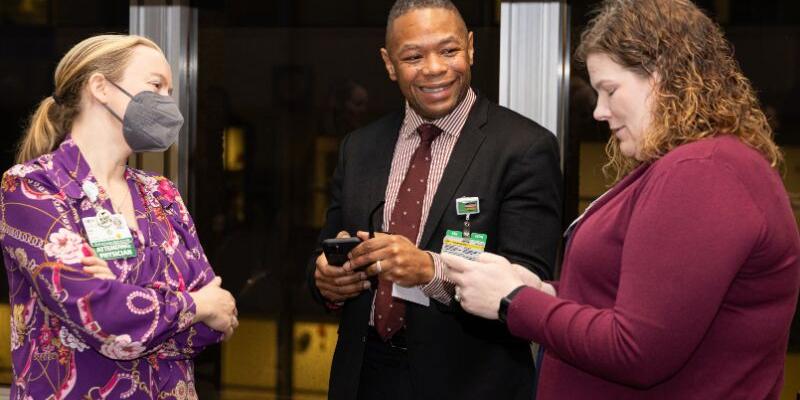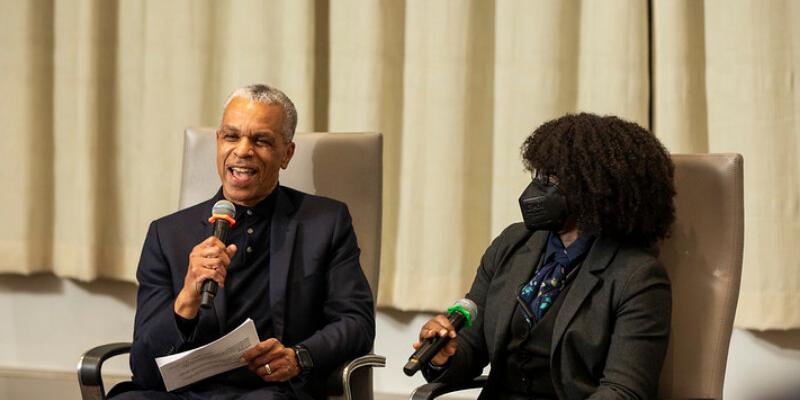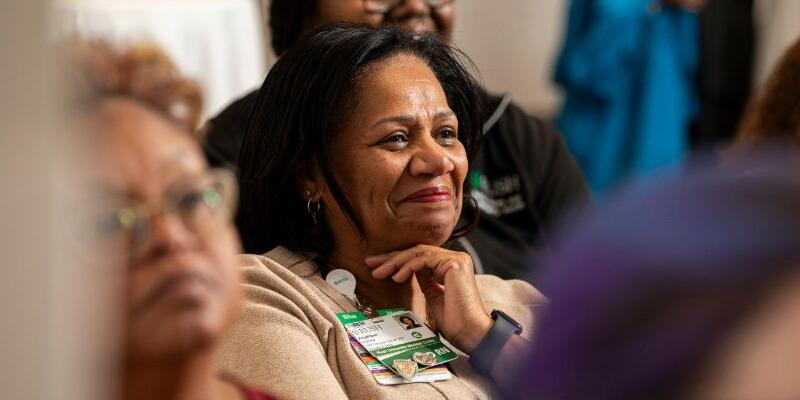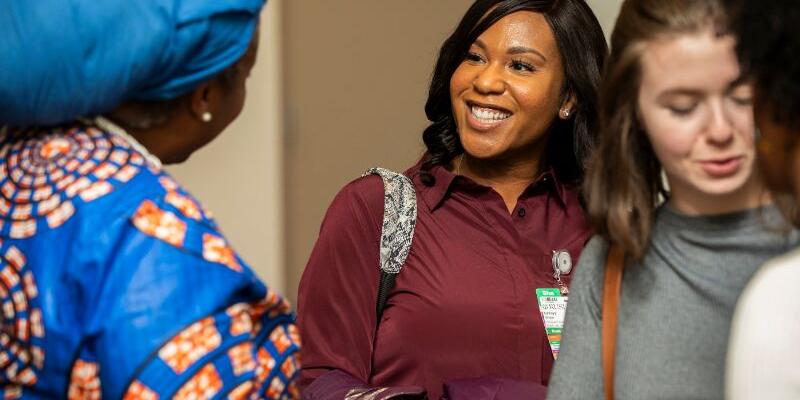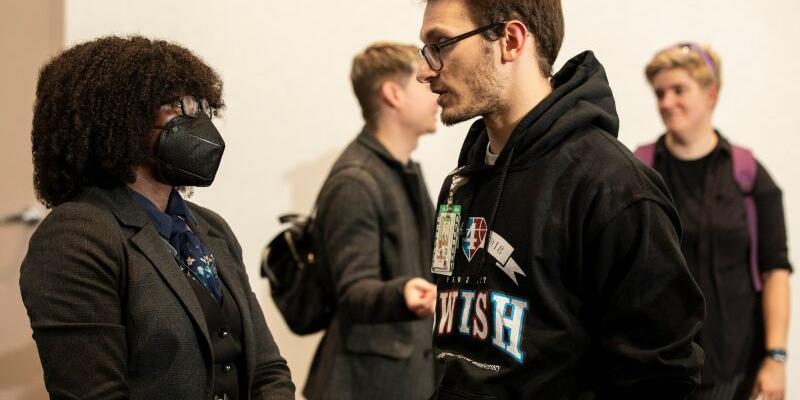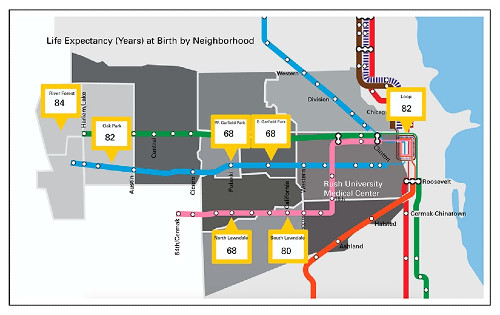What Is the RUSH BMO Institute for Health Equity?
The RUSH BMO Institute for Health Equity links the many health equity initiatives that Rush has spearheaded for decades. It is committed to strategically connecting neighbors, community leaders, nonprofit organizations and other health care institutions to advance health equity — the idea that everyone should get the chance to live their healthiest lives. The institute is a catalyst for community health and vitality through multifaceted approaches to dismantling barriers to health and improving social conditions that can harm people’s health both within and outside of Rush.
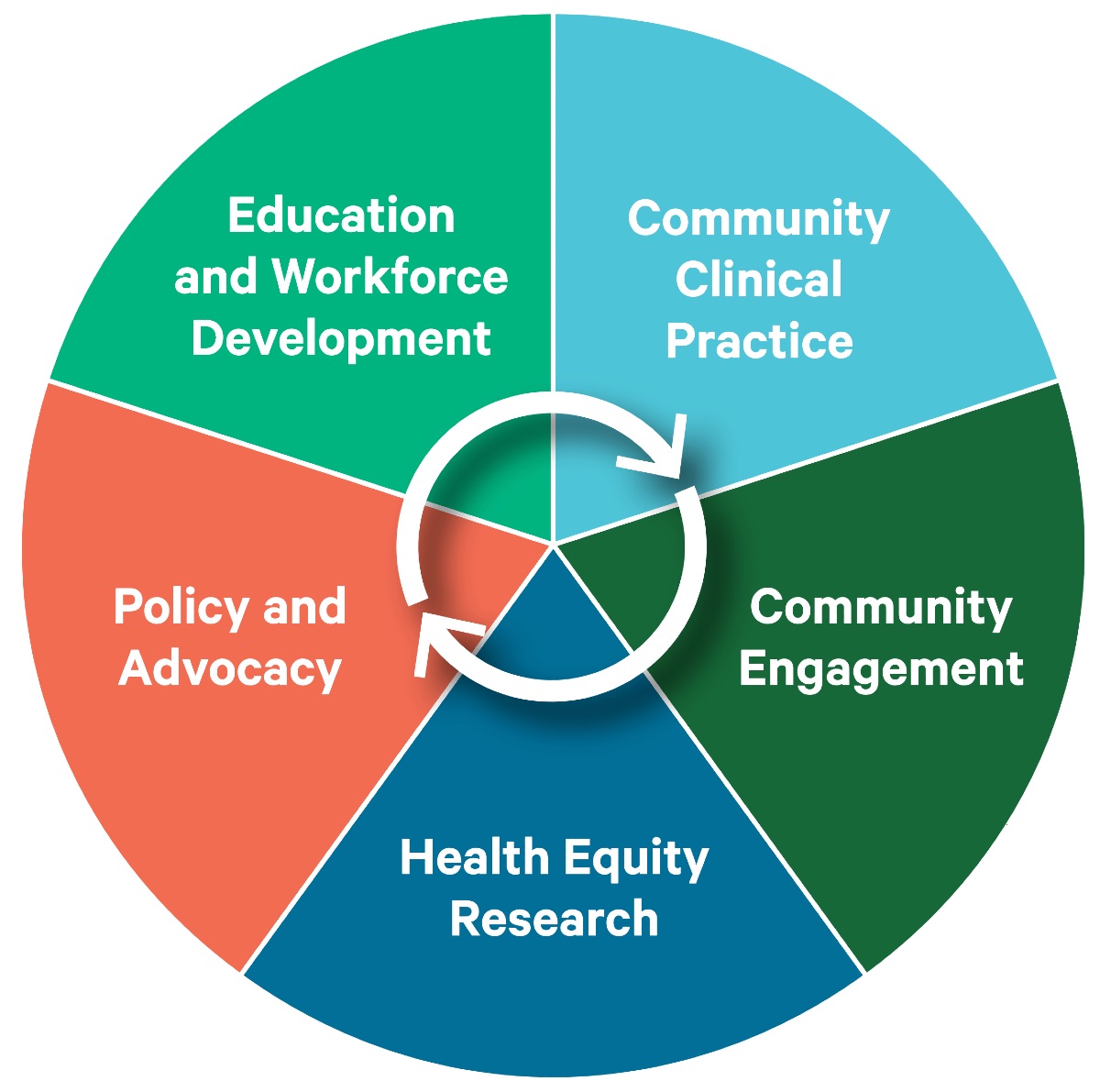
Health Equity Stories Spotlight
Making Strides in Closing Health Care Gaps
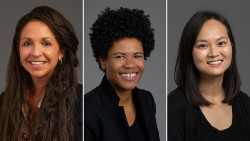
Three Rush University faculty members have received funding from the Charles J. and Margaret Roberts Fund for Preventive Medicine to lead groundbreaking research projects aimed at improving the health outcomes of marginalized populations. Each of their projects aligns with the Rush Health Equity Strategic Plan guiding collective health equity efforts across the Rush system.
Rush Food Pantry: Healing Through Food Access
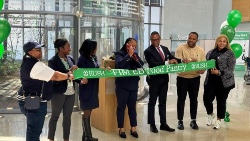
Rush University Medical Center has opened a food pantry within its emergency department. The pantry aims to ensure that every Rush patient has the resources to support their continued recovery and well-being. Through programs targeting food insecurity, Rush has distributed nearly 1.8 million pounds of food to West Side communities.
Speaker Series

Striving Toward Health Equity for All
Rush has a rich history of community-centered care that addresses the many living and working conditions that have a far-reaching impact on community health and well-being. These conditions, known as social determinants of health, lead to health disparities locally and nationally.
We believe that everyone deserves access to high-quality healthcare and that good health care outcomes should not be determined by a person’s ZIP code or ability to pay. We have a deep and steadfast commitment to our community, and that commitment guides us toward achieving our goal of health equity for all.
Health Equity Anti-Racism Training (HEAT) Program
The Health Equity Anti-Racism Training (HEAT) Program is guiding Rush University faculty in developing and implementing anti racism curriculum for students across all three colleges. Workshops begin Wednesday, June 11. This hybrid, five-session workshop will provide educators with essential tools to address racism in academia, refine course content and teaching strategies, and implement lasting change.
Registration ends May 23, 2025. All Rush faculty are welcome to register, regardless of rank or teaching role.
Purpose
The Health Equity Anti Racism Training (H.E.A.T.) Program is guiding Rush University faculty in developing and implementing anti racism curriculum for students across all three colleges. Our mission is to graduate anti racist health care providers who are prepared and motivated to address health disparities and social determinants of health. We are equipping future providers with the tools for combating racism to improve the well-being of underserved and minoritized communities.
Objectives
- Increase the number of university faculty who are prepared to integrate anti racism content and teaching approaches into their courses
- Expand the ranks of health care professionals who understand the social determinants of health (SDOH) and the historical context of racism and trauma in health care
- Engage future health care professionals and equip them with the tools to act as agents of change, by actively challenging Eurocentric worldviews that perpetuate institutional, structural, and interpersonal racism
Process and Timeline
In collaboration with students and community member advisory groups, a steering committee of Rush University faculty have developed anti racism curriculum to accelerate anti racism and health equity education for graduate-level health-profession students.
Faculty from each of the three colleges are being recruited to participate in a five-session interactive workshop guided by the Public Health Critical Race Praxis (PHCRP) framework, which will equip educators to:
- Examine how racism is operating in academia
- Develop racially conscious curricula
- Identify appropriate course and program objectives for change
- Implement, evaluate, and disseminate the work
Program Launch Schedule
Summer 2025
Contact LaToya Wider, program coordinator, for questions or additional information at latoya_n_wider@rush.edu.
Supported by a grant from Genentech, a member of the Roche Group, and funded by the Genentech Foundation
Support Our Work
In Chicago’s Loop, many residents live into their 80s or even 90s. A few train stops away, in Garfield Park, life expectancy plummets to around 66 years old. Decades of community disinvestment, systemic racism and economic deprivation are to blame. Rush has identified solutions — to bring health and social care into historically marginalized communities where people need it most.
Support from our generous community of philanthropic partners propels our work to close Chicago’s life expectancy gap. Make a gift today.
Together, we will work to ensure that everyone, across the Chicago area and beyond, has a fair chance at safe, healthy, fulfilling lives.
![]() Experience real-life voices and stories, and learn about how the RUSH BMO Institute for Health Equity is bringing strategy to life through our interactive 2022 Annual Report.
Experience real-life voices and stories, and learn about how the RUSH BMO Institute for Health Equity is bringing strategy to life through our interactive 2022 Annual Report.
Meet Our Team
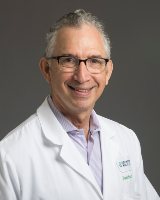
David Ansell
Senior Vice President for Community Health Equity, Rush University Medical Center
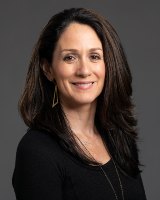
Stephanie Crane
Director, Office of Global Health, Rush University Medical Center

Rukiya Curvey-Johnson
Community Programs & Clinical Practices Co-Chair
VP, Community Health Equity, Community Engagement, Rush
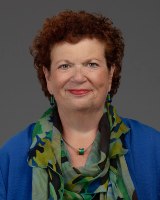
Robyn Golden
Policy & Advocacy Co-Chair
Community Programs & Clinical Practices Co-Chair
Associate Vice President of Social Work and Community Health, Social Work & Community Health, Rush
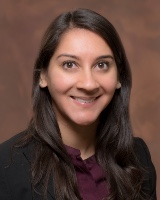
Anisa Jivani
Director, Strategic Initiatives, RUSH BMO Institute for Health Equity
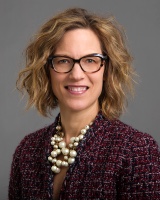
Tricia Johnson
Research Co-Chair
Professor, Department of Health Systems Management, Rush University
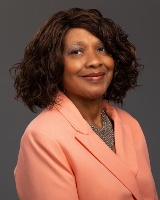
Wrenetha Julion
Education Co-Chair
Assistant Dean for Equity and Inclusion, Department of Women, Children and Family Nursing, Rush University

Beth Lynch
Research Co-Chair
Professor, Department of Family & Preventative Medicine, Rush University
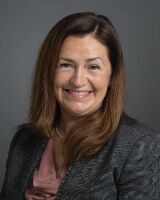
Angela Moss
Education Co-Chair
Assistant Dean of Faculty Practice, College of Nursing, Rush University
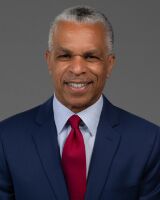
John Rich
Director, RUSH BMO Institute for Health Equity
- Santosh Basapur
Assistant Professor, Department of Family and Preventive Medicine, Rush University - Rebecca Dawar
Senior Program Evaluator, RUSH BMO Institute for Health Equity - Deqa Elmi-Buursma
Administrative Coordinator, RUSH BMO Institute for Health Equity - Jade Ali Johnson
Program Manager, Department of Social Work and Community Health, Rush University - Katherine Koo
Program Manager, Health Innovation, Rush - Joshua Longcoy
Statistician, System Integration, Rush - Rachel Smith
Program Manager, Department of Social Work and Community Health, Rush University - Ofu Takor
Content Strategist, RUSH BMO Institute for Health Equity - LaToya Wider
Program Coordinator, RUSH BMO Institute for Health Equity
2023 Health Equity Scholars
- Sylvia Herbozo
Clinical Psychologis and Associate Professor, Rush University - Lauren Little
Associate Dean of Research and Associate Professor, Rush University - Amanda Mathew
Assistant Professor, Department of Family and Preventive Medicine, Rush University - Fabian Sierra Morales
Director, Neuroimmunology Fellowship, Rush University
2022 Health Equity Scholars
- Rachel Boutte
Clinical Psychologist and Assistant Professor, Department of Family and Preventive Medicine, Rush University - Chuka Emezue
Assistant Professor, Department of Family and Preventive Medicine, Rush University - Anne Hoffmann
Assistant Professor, Departments of Communication Disorders and Sciences and Pediatrics, Rush University - Chien Ching Li
Associate Professor, Department of Health Systems Management, Rush University - Kristen Pallok
Assistant Professor, Division of General Internal Medicine, Rush University
2022 Health Equity Fellows
- Merdijana Kovacevic
Instructor, Department of Psychiatry and Behavioral Sciences, Rush University - Teresa Moro
Assistant Professor, Department of Social Work, Rush University
Connect With Us
Follow us to stay up-to-date on everything health equity at RUSH.
Contact
We want to hear from you! To share comments, ideas or to collaborate, email us at RBIHE@rush.edu.


